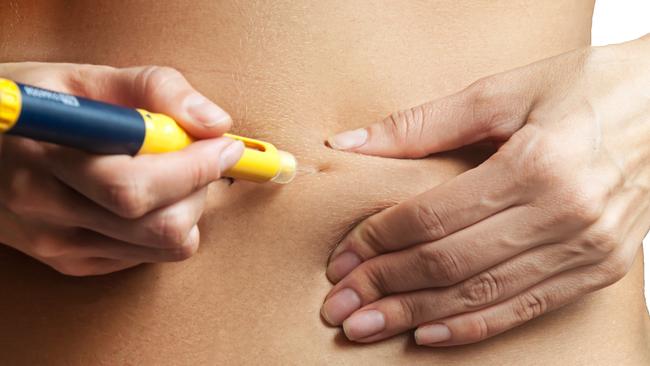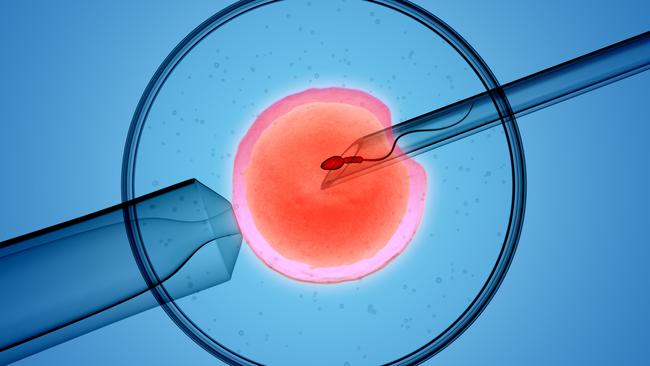What it’s really like to be an egg donor
Unlike donating sperm, donating eggs isn’t something that can be done in less than an hour. It’s a monumental task and act of kindness that deserves monetary reward, writes Alana Schetzer.
Rendezview
Don't miss out on the headlines from Rendezview. Followed categories will be added to My News.
Women should be financially compensated for donating their eggs.
And rather than asking why, we should be asking why not.
For Australian couples hoping to receive a donated egg, there’s an average four year wait list. Because of this wait time and because time is often not on their side, some couples are forced to take drastic — and expensive — measures like going overseas where money talks.
Currently in Australia it’s illegal to pay for or be paid for donating any human tissue or organs, such as blood, sperm or eggs.
Donations must be strictly altruistic. But the reality is — while donating eggs may be altruistic, it’s also an arduous process.
Compensating a woman for her time, physical pain, discomfort and the risks involved in the process is only reasonable. And our current laws are more than likely one of the big reasons behind the low levels of donated eggs available to those in need.
MORE FROM ALANA SCHETZER: No one deserves to be punched. Don’t stoop to that level
This isn’t about turning “buying” eggs into a cottage industry or showering women in cash, but rather reflecting the reality of what egg donation involves. It is neither quick nor easy.
Unlike donating sperm, donating eggs is not something that can be done in an hour — or even 45 seconds, depending on your enthusiasm.
It’s a significant, long-term commitment that involves multiple specialist appointments, invasive medical tests, ongoing hormone injections, and finally, egg harvesting.

It involves hours during work, weekends, and evenings. It’s a significant commitment of a woman’s time, her emotional labour and her body.
The first steps of donating go a little something like this: women are required to attend at least two counselling sessions where question are questioned about their sexual life and health, their fertility history, their family and health histories, whether they already have children or want children in the future. Partners of donors are often asked to attend counselling, too.
Women are then required to take blood tests, a vaginal ultrasound examination, meet with a nurse to discuss any test results and be given the green (or red) light.
MORE FROM ALANA SCHETZER: ‘Bad reputations’ seem to be reserved for women
From there, women must undergo an IVF cycle — which involves daily hormone injections for days, and sometimes weeks — to increase the number of eggs that can later be harvested later on.
These injections can have side-effects like weight fluctuation, headaches, allergic reactions, stomach pressure, mood changes and Ovarian Hyperstimulation Syndrome. In rare cases, it can lead to blood clots and stroke.
After a round of injections, another ultrasound is performed to check if the hormones have worked, and if it has, how many eggs are available for harvesting.
The harvesting itself — which is performed vaginally — takes around 20 minutes and is not only physically uncomfortable, but can result in damage to the bowel or blood vessels.

Under current laws, women can be compensated for direct expenses incurred such as parking fees to attend an appointment, but it fails to acknowledge or provide any compensation structure for the fact that women are forced to miss work — in most cases for many hours — just to make the many appointments needed. There is also no compensation for the physical pain or discomfort.
MORE FROM ALANA SCHETZER: We need kid-free days at public attractions
Offering payment for these aspects of the process is not about creating a lucrative side-earner for the women of Australia with healthy eggs, but fairly compensating them for the significant commitment, pain and time that donation requires.
It’s not just the right thing to do, it’s the obvious. Adequate compensation will almost certainly see donation rates increase, and wait times for those so badly in need of donors drop.
Women who decide who donate their eggs are doing an extraordinary act of kindness. Asking for compensation and acknowledgment seems only fair.
Originally published as What it’s really like to be an egg donor


